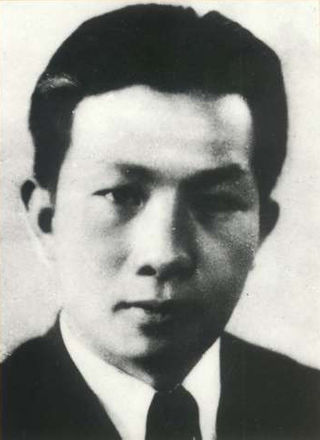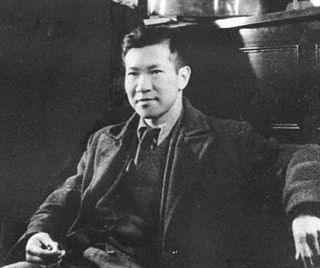A concerto is, from the late Baroque era, mostly understood as an instrumental composition, written for one or more soloists accompanied by an orchestra or other ensemble. The typical three(music)|movement]] structure, a slow movement preceded and followed by fast movements, became a standard from the early 18th century.
"The East Is Red" is a Chinese Communist Party revolutionary song that was the de facto national anthem of the People's Republic of China during the Cultural Revolution in the 1960s. The lyrics of the song were attributed to Li Youyuan (李有源), a farmer from Shaanbei, and the melody was derived from a local peasant love song from the Loess Plateau entitled "Bai Ma Diao" 《白马调》, also known as "Zhima You" 《芝麻油》, which was widely circulated in the area around Yan'an in the 1930s. The farmer allegedly got his inspiration upon seeing the rising sun in the morning of a sunny day.

Nie Er, born Nie Shouxin, courtesy name Ziyi, was a Chinese composer best known for "March of the Volunteers", the national anthem of People's Republic of China. In numerous Shanghai magazines, he went by the English name George Njal, after a character in Njal's Saga.

Alexander Nikolayevich Tcherepnin was a Russian-born composer and pianist.

Sándor Veress was a Swiss composer of Hungarian origin. He was born in Kolozsvár/Klausenburg, Transylvania, Kingdom of Hungary, Austro-Hungarian Empire, nowadays called Cluj-Napoca, Romania, and died in Bern. The first half of his life was spent in Hungary; the second, from 1949 until his death, in Switzerland, of which he became a citizen in the last months of his life.

Alexander Grigori Arutiunian, was a Soviet and Armenian composer and pianist, widely known for his 1950 Trumpet Concerto. A professor at Yerevan State Conservatory, he was recognized with many awards for his work, including the Stalin Prize in 1949 and People's Artist of the USSR in 1970, as well as numerous honors from his homeland of Armenia.

Xian Xinghai or Sinn Sing Hoi was a Chinese composer. He was among the first composers in his country to draw on western classical music and has influenced many later Chinese musicians. Xian composed in all the major musical forms, and is best known for the Yellow River Cantata upon which the Yellow River Concerto for piano and orchestra is based.

Yin Chengzong is a Chinese pianist and composer.
The Yellow River Piano Concerto is a piano concerto arranged by a collaboration between Chinese composers, including Yin Chengzong and Chu Wanghua, and based on the Yellow River Cantata by composer Xian Xinghai. It was originally directed by Jiang Qing, wife of Chairman Mao, and since its highly acclaimed premiere in 1970 during the Cultural Revolution the Concerto has become popular in China and around the globe. It is noted for its revolutionary theme that integrates a classic post-romantic music structure with passion, beauty and power, along with highly skilled solo phases. The piano concerto is meant to represent the very fighting spirit of Chinese people and the determination of a new-born nation, in the context of a long, vividly struggling history of the Yellow River.
Chen Yi is a Chinese-American composer of contemporary classical music and violinist. She was the first Chinese woman to receive a Master of Arts (M.A.) in music composition from the Central Conservatory of Music in Beijing. Chen was a finalist for the 2006 Pulitzer Prize for Music for her composition Si Ji, and has received awards from the Koussevistky Music Foundation and American Academy of Arts and Letters, as well as fellowships from the Guggenheim Foundation and the National Endowment for the Arts. In 2010, she was awarded an Honorary Doctorate from The New School and in 2012, she was awarded the Brock Commission from the American Choral Directors Association. She was elected to the American Academy of Arts and Letters in 2019.
David Blake is an English composer and founder member of the Department of Music at the University of York.
Ma Sicong was a Chinese violinist and composer. He was referred to in China as "The King of Violinists." His Nostalgia (思鄉曲) for violin, composed in 1937 as part of the Inner Mongolia Suite (內蒙組曲), is considered one of the most favorite pieces of 20th century China.

The Central Philharmonic is a symphony orchestra based in Beijing, China. Its predecessor was the Central Opera Company Orchestra. In 1996, it was renamed the China National Symphony Orchestra.

Eduard Hayrapetyan is an Armenian composer of contemporary classical music and educator.
Vladimír Soukup was a Czech post-romantic composer.
Guang Weiran, born Zhang Guangnian, was a Chinese poet and military leader. He is best known for writing the poem that inspired the Yellow River Cantata.
The Production Cantata is a cantata by Chinese composer Xian Xinghai (1905–1945) (冼星海). Composed in Yan'an in early 1939 during the Second Sino-Japanese War, the work is a setting of patriotic texts by Chen Bingjun.









